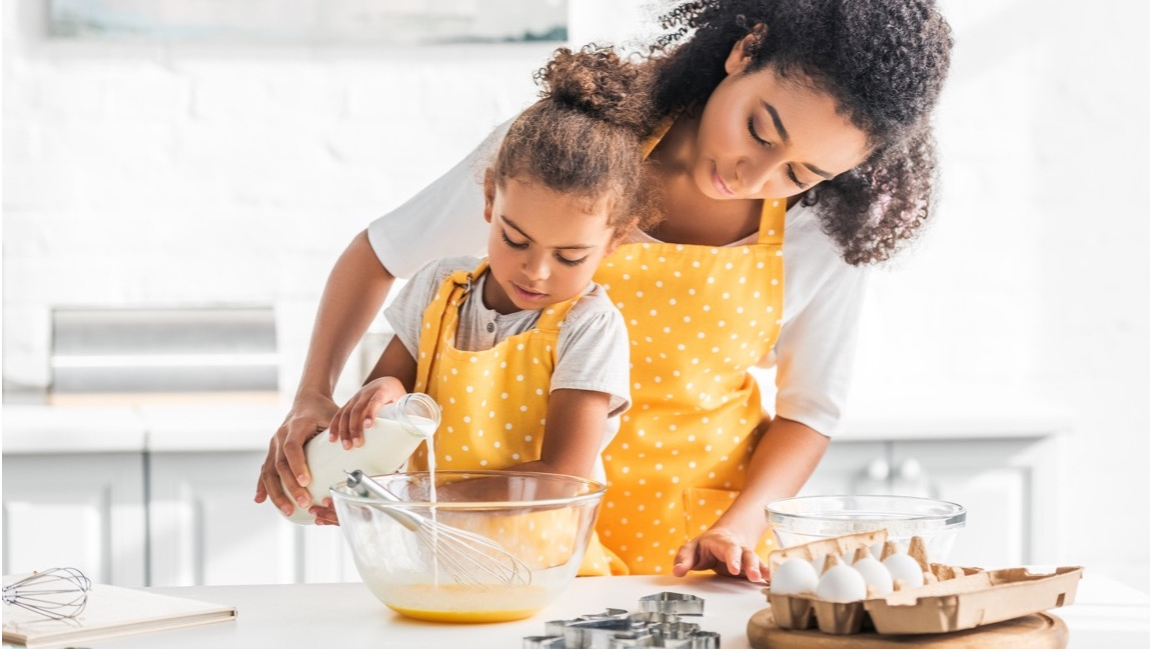Cooking with Kids
- Written by: Samira Ali & Lynne Lafave

Children love hands-on learning! Preschool aged children tend to want to do everything themselves, but the skills for that independence are still emerging. In order for children to develop the necessary skills to become independent, they need to start small and practice!
A great way to build a child’s independence is by including them in food preparation.
While cooking with young children can be less efficient, there are many short and long-term benefits.
What are the benefits of engaging children in the kitchen?1
Development of basic skills.
Cooking and baking with children can promote a child’s fine motor skills. By allowing children to pick leaves off of fresh herb stems, squeeze lemons, or mix the ingredients, children can develop coordination and strength in their hands, wrists, and fingers!
Basic math and literacy skills can be practiced in the kitchen as a fun activity. To encourage math skills, count the eggs together as you use them or show them how to measure ingredients. Read the recipe out loud together as a way to introduce new vocabulary and promote literacy.
Increased willingness to try new foods.
Young children can be picky eaters, but when they are engaged in the process of food preparation, they may become more open to trying new foods. While helping cook, children get to explore the ingredients with their senses; they are able to see, feel, and smell the ingredients, which can encourage children to taste new things. Having conversations while cooking or eating can reduce the fear of trying new things and create more excitement to help in the kitchen!
Development of independence and confidence.
Preschool aged children love to think they can do everything by themselves – they want to feel in control and be independent, even though they are not quite there yet. To experience that independence, children can be given small manageable tasks that they can do without help. Create a small area for them to work and provide them with one task at a time, such as tearing lettuce for salad. When they can focus on their own task or see the meal they helped prepare, they will feel a sense of accomplishment!
How can you guide children’s participation in the kitchen?2
Research suggests that guiding a child’s participation in the kitchen can reduce the amount of help the child will need over time. In order to effectively guide a child’s participation in the kitchen:
Discuss the goals of the activity with the child.
Tell the child what you will be making and what their role will be. Provide them with only a few choices, so they can understand their role in the process while feeling a sense of independence.
Provide enough, but not too much, guidance.
The best way to support a child in building a skill is to provide just enough guidance that allows them to complete the task without getting frustrated. In addition, because children like to feel the ownership of their contributions, it is important to provide them with a manageable task that they can complete with minimal intervention. When a task is too advanced, the child’s confidence is affected and might lead to a meltdown. Be patient and understanding, progress takes time!
Ladder tasks over time.
Encourage the child’s future competencies by gradually allowing more independence in their tasks. The more experience children get in the kitchen, the more competent they will become. Once they feel confident in their abilities, you can provide them with more responsibility.
Every individual can benefit from learning to cook. Developing basic cooking skills during early childhood can inspire independence, confidence, and the skills necessary to cook for themselves in the future!
References
- Kids Health. (2014, November). Cooking with preschoolers. Retrieved from https://kidshealth.org/en/parents/cooking-preschool.html
- Vandermaas-Peeler, M., Way, E., & Umpleby, J. (2003). Parental guidance in a cooking activity with preschoolers. Applied Developmental Psychology, 24, 75-89. https://doi.org/10.1016/S0193-3973(03)00025-X